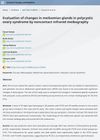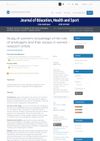 1 citations,
September 2016 in “Journal of Obstetrics and Gynaecology Research”
1 citations,
September 2016 in “Journal of Obstetrics and Gynaecology Research” The study found no significant link between Helicobacter pylori infection and polycystic ovary syndrome in young females.
 65 citations,
May 2010 in “Current Women's Health Reviews”
65 citations,
May 2010 in “Current Women's Health Reviews” Oxidative stress is a key factor in the development of Polycystic Ovary Syndrome, and weight management can improve symptoms.
[object Object]  June 2016 in “The Egyptian Journal of Fertility and Sterility”
June 2016 in “The Egyptian Journal of Fertility and Sterility” The study concluded that personalized treatment, including medical and cosmetic approaches, is effective for women with PCOS and hirsutism.
 88 citations,
May 2012 in “Human Reproduction Update”
88 citations,
May 2012 in “Human Reproduction Update” Women with PCOS may take longer to get pregnant but can have a normal family size, and should manage their overall health to reduce long-term health risks.
 29 citations,
November 2011 in “Human Fertility”
29 citations,
November 2011 in “Human Fertility” Many women with PCOS have undiagnosed health issues and show different symptoms based on the clinic they visit.
 1 citations,
April 2019 in “Endokrynologia Polska”
1 citations,
April 2019 in “Endokrynologia Polska” Healthy diet and exercise are important for women with PCOS to manage weight and metabolic issues, and supplements like omega-3, vitamin D, and inositol may help.
 13 citations,
March 2019 in “Physiological Research”
13 citations,
March 2019 in “Physiological Research” Overweight women with PCOS have higher levels of certain hormones that could indicate a higher risk of heart and metabolic problems.
 January 2019 in “ISGE series”
January 2019 in “ISGE series” The document concludes that effectively managing PCOS requires a multifaceted approach.
 1 citations,
September 2019 in “Journal of surgery and medicine”
1 citations,
September 2019 in “Journal of surgery and medicine” People with polycystic ovary syndrome have worse meibomian gland and ocular surface conditions.
1 citations,
January 2023 in “Journal of Obstetrics and Gynaecology” High DHEA and short cervical length in women with PCOS and recurrent miscarriages may harm pregnancy outcomes.
 1 citations,
February 2018 in “InTech eBooks”
1 citations,
February 2018 in “InTech eBooks” PCOS in lean women is a serious health condition with implications beyond fertility, affecting metabolism and increasing cardiovascular disease risk.
 16 citations,
September 2018 in “Clinical Biochemistry”
16 citations,
September 2018 in “Clinical Biochemistry” The document concludes that more research is needed to fully understand the causes of PCOS.
 9 citations,
May 2017 in “Gynecological Endocrinology”
9 citations,
May 2017 in “Gynecological Endocrinology” Transvaginal hydrolaparoscopy is effective for increasing ovulation and pregnancy rates in women with PCOS who didn't respond to clomiphene.
 July 2023 in “Journal of Education, Health and Sport”
July 2023 in “Journal of Education, Health and Sport” Most women lack knowledge about androgens and their excess symptoms.
 30 citations,
April 2014 in “Seminars in Reproductive Medicine”
30 citations,
April 2014 in “Seminars in Reproductive Medicine” Diagnosing PCOS in teenagers is hard because its symptoms often look like normal puberty, and there's a need for better diagnosis methods and agreement on criteria.
 32 citations,
April 2016 in “Journal of Obstetrics and Gynaecology Research”
32 citations,
April 2016 in “Journal of Obstetrics and Gynaecology Research” Women with severe types of PCOS are more likely to have metabolic syndrome, and belly fat is a key predictor of this risk.

PCOS has a strong genetic basis, but more research is needed to fully understand it.
 1 citations,
October 2015 in “Journal of endocrinology and diabetes”
1 citations,
October 2015 in “Journal of endocrinology and diabetes” Understanding Polycystic Ovary Syndrome (PCOS) and its causes can lead to effective treatments.

The document concludes that accurate diagnosis and management of PCOS are crucial due to its associated health risks.
 August 2008 in “Obstetrics & gynecology science”
August 2008 in “Obstetrics & gynecology science” Polycystic Ovary Syndrome (PCOS) is a complex disorder with both immediate and long-term health effects, including menstrual issues, infertility, and increased risk of diabetes and heart disease.
 20 citations,
January 2008 in “Reproductive Biomedicine Online”
20 citations,
January 2008 in “Reproductive Biomedicine Online” Sexual orientation does not affect the prevalence of PCOS or fertility rates in women undergoing artificial donor insemination.
 16 citations,
January 2007 in “Journal of Obstetrics and Gynaecology”
16 citations,
January 2007 in “Journal of Obstetrics and Gynaecology” The document suggests various treatments for PCOS, including medication for menstrual issues, insulin resistance, and excess hair, as well as fertility treatments, while highlighting the need for personalized care and lifestyle changes.
October 2017 in “The Egyptian Journal of Hospital Medicine ” More young women are getting diagnosed with PCOS, which can lead to other health problems, but early treatment can help.
 1 citations,
October 2018 in “International Journal of Research in Dermatology”
1 citations,
October 2018 in “International Journal of Research in Dermatology” Most women with excessive hair growth in South India have hirsutism without a known cause, with common facial hair growth and some showing hormonal imbalances and polycystic ovaries.
[object Object]  October 2010 in “Cambridge University Press eBooks”
October 2010 in “Cambridge University Press eBooks” Lifestyle changes like diet and exercise are key for treating overweight women with polycystic ovary syndrome.
 37 citations,
January 2008 in “Gynecological Endocrinology”
37 citations,
January 2008 in “Gynecological Endocrinology” Shorter CAG repeats in a specific gene may increase male hormone activity and symptoms like acne and excess hair in women with PCOS.
 131 citations,
August 2004 in “Best Practice & Research in Clinical Obstetrics & Gynaecology”
131 citations,
August 2004 in “Best Practice & Research in Clinical Obstetrics & Gynaecology” The conclusion is that PCOS is caused by ovarian sensitivity to hormones and disrupted hormone control, possibly due to ovarian factors, and more research is needed.
 11 citations,
July 2007 in “Journal of Hepatology”
11 citations,
July 2007 in “Journal of Hepatology” Women with PCOS often have liver disease, so liver health checks are important for them.
 97 citations,
February 2007 in “Clinical Obstetrics and Gynecology”
97 citations,
February 2007 in “Clinical Obstetrics and Gynecology” The definition of Polycystic Ovary Syndrome may change with new research, and careful screening is key for managing the condition.
 59 citations,
August 2007 in “Clinical Endocrinology”
59 citations,
August 2007 in “Clinical Endocrinology” The current methods for diagnosing polycystic ovary syndrome are too vague and may lead to misdiagnosis and problems in research.




























